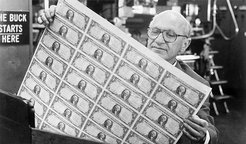The Market's People
Mass Media and the Making of Neoliberal Populism in the US and UK, 1940–1990
Sören Brandes (PhD Project)

Over the last decade, numerous attempts have been made to explain the rise of neoliberalism. Works of historical research by authors such as Daniel Stedman Jones, Angus Burgin, and Philip Mirowski have conceptualized neoliberalism as a transatlantic network of actors originating in the 1940s. Ever since, this network has worked purposefully towards the social acceptance and political implementation of neoliberal concepts. My project builds on this literature by taking up an as of yet unexplored side of the neoliberal project: its interaction with mass media.
My project analyses the media history of neoliberalism from a transnational perspective. Within this framework, the project focuses not so much on what neoliberals said, but on how they conveyed their message. Which formats and rhetorical, stylistic, and audiovisual techniques and devices did they use to circulate neoliberal knowledge? What consequences did the use of different kinds of media (for example, newspaper articles, novels, TV series, TV appearances, and interviews) have for the content of the neoliberal argumentation? The dissertation will analyse this nexus by drawing on a wide range of source materials. Books like Friedrich Hayek’s Road to Serfdom (1944), novels like Ayn Rand’s Atlas Shrugged (1957), and television sources like Milton Friedman’s series Free to Choose (1980) will be examined.
The preliminary hypothesis of the project is that the neoliberal message became more populist with the increased use of more popular media formats. The market populism that evolved out of this process portrayed government as a powerful force working from above, while markets were presented as the site – and the saviour – of the ‘ordinary’ man and woman on the street. Thus, the message of neoliberalism shifted in line with the media used and the audience addressed. While it began as a programme distributed in philosophical treatises and aimed at convincing intellectuals, it gradually turned into an arsenal of simple images, metaphors, and narratives directed at a broader public, offering solutions for the problems of the world as well as those of the everyday life of the individual. Thus, the media historical dimension of neoliberalism is essential for understanding its general historical trajectory.
